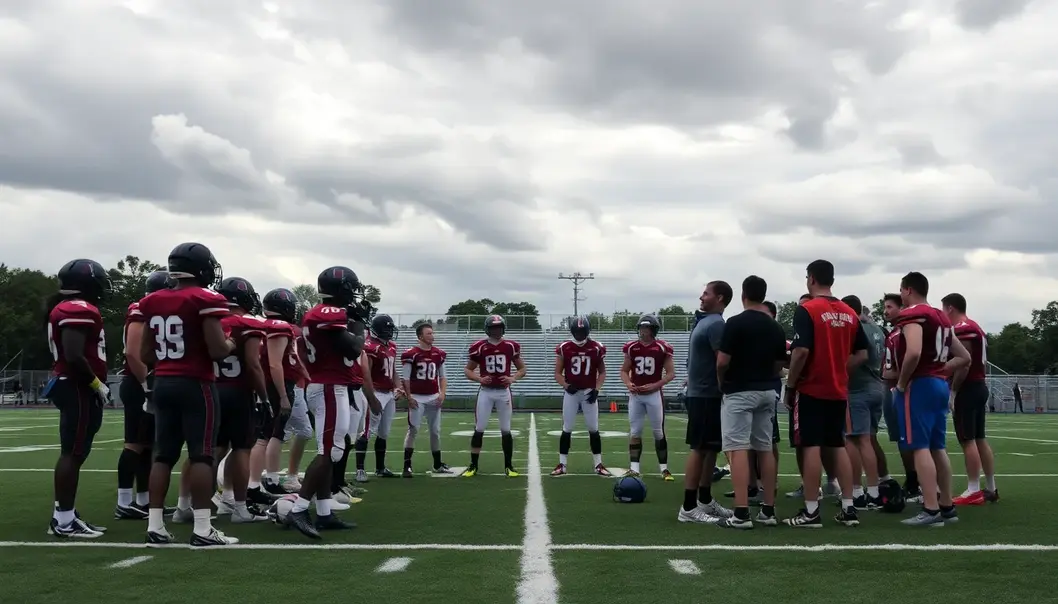Peer pressure is an inescapable part of teenage life, especially for those immersed in the world of sports. For teen athletes, the stakes are even higher as they navigate the dual pressures of team dynamics and personal ambitions. Parents have a pivotal role in shaping how their teens respond to these pressures, ensuring they develop resilience and maintain their integrity. Understanding the unique challenges faced by young athletes and equipping them with strategies to stand firm can empower them to thrive, both on and off the field. This guide offers insights into how sports-loving families can encourage teens to remain true to themselves amid the challenges of peer influence.
Understanding the Sports Arena: A Hotbed for Peer Pressure

The sports environment for teenagers is often permeated with unique challenges that amplify peer pressure. The sports arena isn’t just a field, rink, or court; it’s a microcosm of various societal expectations and cultural norms that affect how teens perceive themselves and their abilities.
Team expectations are at the forefront of this pressure. Every team, irrespective of the sport, has an implicit culture that prescribes how players should behave. These include attitudes towards winning, discipline, and even interpersonal relationships. When Tom joined his high school’s basketball team, he noticed how the team members prioritized winning above individual well-being. This unspoken rule pressured Tom to push his limits, even when dealing with a significant knee injury. The fear of being labeled as weak fueled his decision to continue playing, which risked his long-term health.
Cultural norms within sports further define how athletes see themselves within their team hierarchy. There is often a prevailing narrative that equates dedication with sacrificing personal time and interests. This mindset can lead athletes to choose practice over attending a family event or social outing, fearing their teammates would regard them as less committed.
The intense competition inherent in sports also impacts young athletes’ mental health and decision-making abilities. The pressure to outdo peers can lead to anxiety, burnout, and a diminished sense of self-worth if not managed appropriately. Sarah, a talented swimmer, experienced intense competition pressure during her high school regional championships. The relentless drive to outshine her competitors left her feeling isolated and anxious, ultimately affecting her performance and enjoyment of the sport.
Moreover, peer pressure in sports can sometimes push teens towards unhealthy behaviors as they try to conform to peer group dynamics. From the benign tradition of pre-game rituals to more concerning issues like substance misuse to enhance performance, the urge to fit in can lead young athletes to compromise their values.
Understanding these dynamic pressures is crucial for parents aiming to support their teen athletes effectively. Acknowledging these scenarios can help create strategies to mitigate the negative impacts on their children and promote a healthier sports culture. As we move forward, it’s essential to focus on structuring environments that support well-being over mere performance.
For insights on maintaining happiness amid challenges, you can explore life lessons and reflections on happiness in the cat lover’s guide.
Empowering Teens: Practical Strategies for Handling Pressure

As a parent guiding your teen athlete through the complexities of sports, offering practical strategies for handling peer pressure is crucial. Open and honest communication forms the cornerstone of this support. Start conversations by making the environment comfortable and inviting for your teen to express their feelings and concerns. Encourage your teen to share specific situations where they felt pressured, and listen actively without immediately offering solutions. Your primary role in these interactions is to validate their emotions and experiences, fostering a sense of understanding and trust.
Fostering a positive self-image is another essential strategy. Encourage your teen to set personal goals that align with their values and passions, as these can serve as anchors when external pressures arise. Reinforce their strengths and celebrate their achievements beyond the scope of sports. By helping them see their worth outside of athletic achievements, you can buffer the impact of peer pressure related to performance.
Promoting open discussions about sports culture and the challenges it presents is equally important. Create opportunities to talk about the unique expectations that come with team dynamics, competitiveness, and the culture around sports. Use these discussions to highlight that it’s okay to step back and reassess what’s genuinely important. This perspective allows teenagers to embrace individuality, discouraging the need to conform to peer-driven expectations.
Equipping your teen with the ability to establish healthy boundaries can empower them in social and sporting environments. Work with your teen to identify their limits and help them communicate these effectively to peers, coaches, and teammates. Building assertiveness in their responses when faced with unwanted peer pressure is a vital step toward maintaining personal integrity and confidence.
Lastly, fostering resilience and mental toughness is a significant part of helping your teen navigate peer pressure. Encourage them to view challenges as opportunities for growth rather than threats. Activities such as mindfulness, visualization, and even focused breathing techniques can bolster mental resilience. Promote the idea that setbacks are part of the journey, not the end of it. Encourage them to learn from each experience, maintaining a forward-looking, resilient mindset.
Empowering your teen athlete to handle pressure involves a blend of communication, self-awareness, and resilience-building. By actively engaging in these strategies, you can help your teen navigate peer pressures with confidence and self-assuredness.
Final words
Helping your teen athlete manage peer pressure requires a strategic approach and open communication. Encouraging resilience, self-awareness, and independent thinking can empower them to navigate their sports environment confidently. By understanding the pressures teens face, parents can better support their young athletes, enabling them to flourish both in their sports and personal lives. Stand by them as they tackle these pressures, and celebrate their journey towards becoming strong, autonomous individuals.
Support your teen athlete today. Explore our resourceful guides tailored for sports-loving families!
Learn more: https://www.parentsportsguide.com
About us
Our platform offers comprehensive guides and resources designed to support parents of teen athletes. We focus on providing actionable strategies for building resilience, promoting mental health, and equipping families to handle common sports-related challenges.

